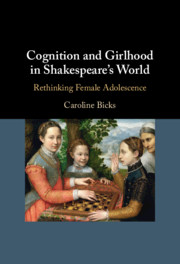Book contents
- Cognition and Girlhood in Shakespeare’s World
- Cognition and Girlhood in Shakespeare’s World
- Copyright page
- Dedication
- Contents
- Figures
- Acknowledgements
- Introduction
- Chapter 1 “A spectacle to men and angells”
- Chapter 2 “Imagination helps me”
- Chapter 3 “The progresse of an Art”
- Chapter 4 “If I should tell / My history”
- Chapter 5 “Put on the minde”
- Chapter 6 “From thirteene Yeares … resolved to serve God”
- Coda
- Notes
- Bibliography
- Index
Chapter 3 - “The progresse of an Art”
Daughters and the Invention of New Knowledges
Published online by Cambridge University Press: 24 June 2021
- Cognition and Girlhood in Shakespeare’s World
- Cognition and Girlhood in Shakespeare’s World
- Copyright page
- Dedication
- Contents
- Figures
- Acknowledgements
- Introduction
- Chapter 1 “A spectacle to men and angells”
- Chapter 2 “Imagination helps me”
- Chapter 3 “The progresse of an Art”
- Chapter 4 “If I should tell / My history”
- Chapter 5 “Put on the minde”
- Chapter 6 “From thirteene Yeares … resolved to serve God”
- Coda
- Notes
- Bibliography
- Index
Summary
Chapter Three moves from the front to the middle of the brain, believed to house the rational faculty that assessed forms and ideas, and put them together in novel ways. The chapter explores a persistent early modern connection between fathers, daughters, and the production of new knowledges — one that found expression in the popular emblem of Truth, the daughter of Time (Veritas temporis filia). After analyzing how this figure was used to embody scientific and religious innovation, the chapter then considers the revival of an ancient myth about the potter Dibutades’ daughter, a girl who traces her absent lover’s form and (according to early modern revisions of her story) invents the art of painting. These two daughters help frame the chapter’s analysis of two Shakespearean ones, All’s Well That Ends Well’s orphaned Helen and The Tempest’s island-bound Miranda. After briefly considering how Helen uses her physician-father’s art to produce her own ambitious project, the chapter finishes with a reading of The Tempest. The chapter argues that Miranda’s beating mind challenges her father Prospero’s rough, old art, and that her brainwork signals intellectual progress and the changes, based on observation, that were emerging from new scientific and philosophical ideas.
Keywords
- Type
- Chapter
- Information
- Cognition and Girlhood in Shakespeare's WorldRethinking Female Adolescence, pp. 105 - 126Publisher: Cambridge University PressPrint publication year: 2021

